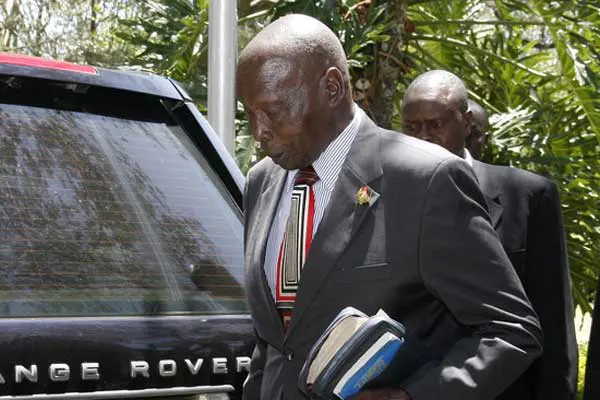
Former President Daniel arap Moi, “one of the stiffest heads of state in Africa,” was “one of our best friends,” writes a retired US diplomat in a new book, The Mind of the African Strongman.
The Moi years (1978-2002) were marked by major corruption scandals, political repression and “mysterious deaths of political personalities,” observes Mr Herman Cohen, the top US official for Africa during the administration of President George H.W. Bush (1989-1993).
Mr Moi also maintained “tight control over all economic opportunity,” thereby discouraging private investment, and “made no effort to defuse the high tensions of ethnic rivalries and hatred that continue to pervade Kenyan politics,” says the former assistant secretary of state for African affairs.
Yet from the US point of view, Mr Cohen adds, “Moi could not have been a more loyal friend.”
Kenya’s second president “never refused any of our requests,” the author recounts. Jomo Kenyatta International Airport was “totally open” to US military flights during the elder Bush’s intervention in Somalia in 1992, Mr Cohen notes.
Mr Moi also granted the US rights to use the port of Mombasa for military operations in the Indian Ocean, he adds.
In addition, the Kenyan leader reportedly played a valuable role as an intermediary with Mozambique rebel leader Alphonse Dhlakama.
Mr Moi readily agreed to assist the US by coaxing Mr Dhlakama to join negotiations with Mozambique President Joaquim Chissano, Mr Cohen recalls. The Kenyan felt a kinship with the head of the Renamo rebel group, which was supported by apartheid South Africa, because both men were evangelical Christians, according to the book.
Mr Moi is quoted as saying, “How can people accuse Dhlakama of being a human rights violator when he goes around giving out Bibles?”
CONTROVERSIAL ACCOUNT
The book’s eight-page chapter on Mr Moi also includes what will likely prove to be a controversial account of a visit to Washington in 1990 by the Kenyan president and his Foreign minister, Robert Ouko.
Mr Cohen incorrectly states that the January trip took place “during the second half of 1990.” Mr Ouko was found murdered on February 13, 1990.
Due to US objections to the detention of democracy advocates in Kenya, State Department officials “did not recommend that President Bush receive him” when Mr Moi came to Washington on that occasion, Mr Cohen reveals.
Contrary to other reports on that tour of the US capital city 25 years ago, Mr Cohen says Dr Ouko had a private breakfast with President Bush at the White House. At about the same time, Mr Cohen was having breakfast at Mr Moi’s invitation at the Kenyan leader’s Washington hotel. Apprised only afterward of the Bush-Ouko meeting, Mr Cohen writes that he “demanded to know how that event could have taken place without my advance knowledge.”
Mr Cohen says the White House breakfast had been arranged following a phone call by Mr Ouko, a friend of the US president from their time as heads of their respective delegations at the United Nations. “Bush was like that,” Mr Cohen writes. “When he made friends during his public service, especially in diplomacy, he kept in touch, and invited those friends to call when they came to Washington.”
The conversation at the White House breakfast “had nothing to do with US-Kenya bilateral relations,” Mr Cohen states. Mr Moi did not know of the Bush-Ouko meeting in advance, and “I could imagine his fury” when he learned of it, Mr Cohen adds. The book sheds no light on the circumstances of Mr Ouko’s killing, with Mr Cohen saying only that the foreign minister died “under suspicious circumstances.”
The Mind of the African Strongman also examines the role of US Ambassador Smith Hempstone in pressing for political freedom in Kenya.
Mr Hempstone, who died in 2006, was proved right when he warned Mr Cohen following a meeting with Mr Moi, apparently in late 1989, that the Kenyan head of state would renege on a promise he had made to release all detained pro-democracy activists.
Ambassador Hempstone is paraphrased in the book as saying Mr Moi would not make good on his commitment because he was “too stubborn and too paranoid when it came to internal politics.”
Described by Mr Cohen as personally friendly but with “an absolute need to appear presidential,” Mr Moi is also said in the book to have “a dour personality [that] did not help him deflect the growing pro-democracy movement.”
The US responded to Mr Moi’s refusal to acquiesce to multiparty politics by suspending military aid to Kenya. It was Washington’s perception at the time that “the nation that had been something of a poster child for an African open society was sinking into the mainstream of corrupt African authoritarianism.”
Mr Moi did subsequently permit at least a limited degree of political freedom, and ties with the US were fully restored. The ups and downs of the dealings with President Moi highlighted “the dilemma of US policy in Africa,” Mr Cohen writes.
“How do we cope with human rights atrocities committed by our best friends? It isn’t easy.”
SOURCE –nation.co.ke
US Top Diplomat Recalls America Dealings with Moi
US Top Diplomat Recalls America Dealings with Moi
US Top Diplomat Recalls America Dealings with Moi





